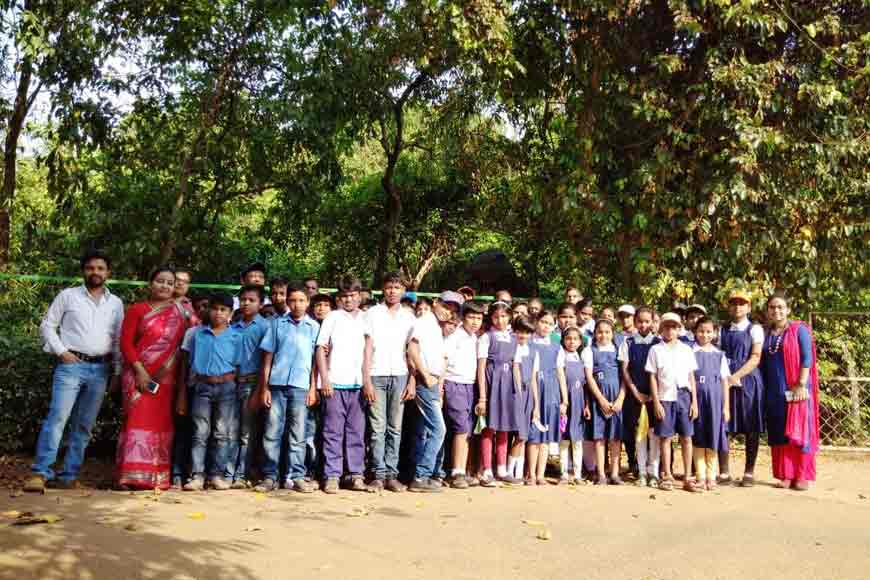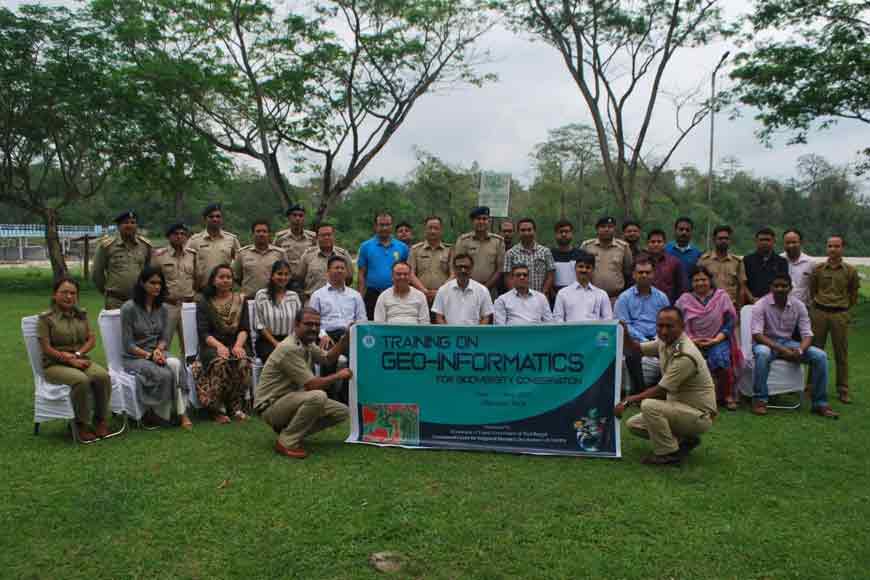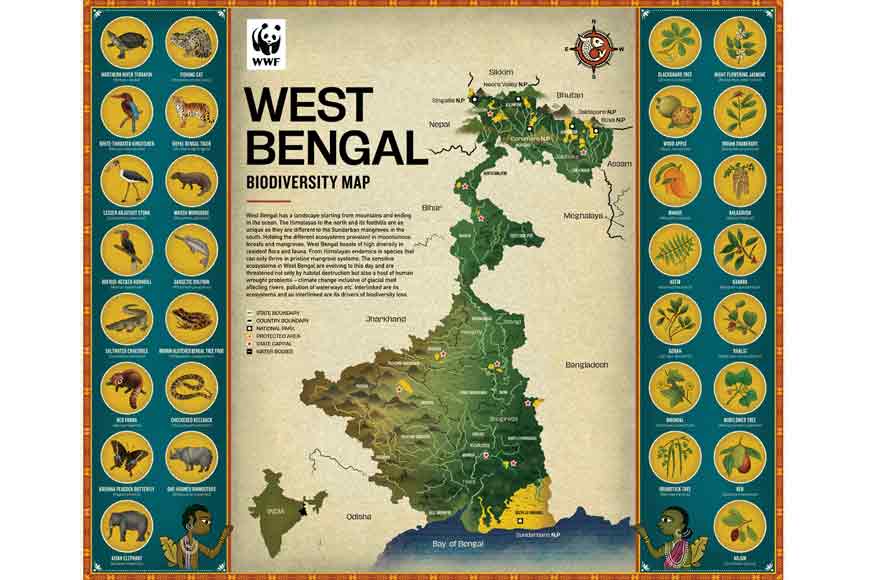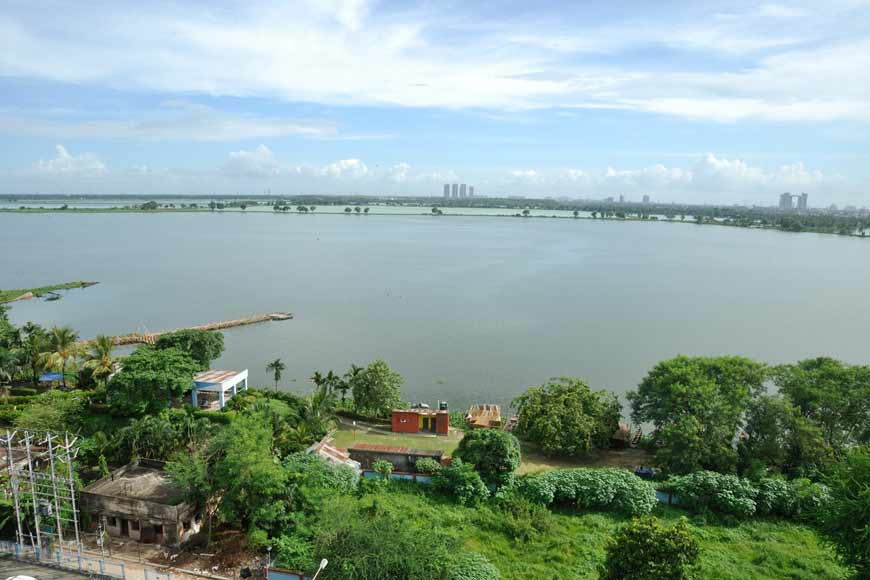Get to know about the biodiversity of West Bengal with just a click of a button!

Are you aware of the flora and fauna of the State? In our busy lives, we often tend to forget about the ecosystem and how big a role it plays in keeping our atmosphere in check. Animals play a crucial role in maintaining the balance and functioning of ecosystems. Animals are an integral part of Earth’s biodiversity. The presence of diverse animal species ensures a healthy and resilient ecosystem capable of withstanding environmental changes.
Many animals, such as bees, butterflies, bats and birds, play a vital role in pollination. They transfer pollen from one flower to another, enabling the reproduction and fertilization of plants. This process is essential for the production of fruits, seeds, and the overall survival of plant species. Animals contribute to nutrient cycling within ecosystems. They act as decomposers, scavengers, and predators, breaking down organic matter and recycling nutrients back into the environment. This process enriches the soil, supports plant growth, and sustains the overall productivity of ecosystems. Predators and prey interactions are crucial for maintaining balanced populations within ecosystems. Predators help control the population of herbivores, preventing overgrazing and maintaining the health of plant communities. Additionally, the removal of weak or sick individuals by predators helps maintain genetic diversity within prey populations.

It is not possible to keep informed always about our surroundings due to the daily hustle. How many types of trees are there in the State or how many types of fish are grown in the waters of Bengal, what types of birds and reptiles can still be seen etc- now, all of this information will be available in just one click. In the new portal of the West Bengal Biodiversity Board (WBBB), everything about the flora and fauna of the state can be known. Such as all kinds of animals, plants, and reptiles of Bengal with their local names, scientific names, which species they belong to, and their lifespan – everything will be available at this portal.
The West Bengal Biodiversity Board was formed on September 16, 2004, in compliance with the Biological Diversity Act, 2002, as a statutory body under the Department of Environment, Govt. of West Bengal. The WBBB functions towards ensuring proper implementation of the Biological Diversity Act, 2002. From this portal, students of schools and colleges would benefit and at the same time, the Forest department and the municipality will also benefit. The Board supported various schools and institutions to organise Bio-Tour or Jeevan Safar for school students to recognise common plants, animals and other organisms in their native environment. It also aimed to promote awareness and sensibility in individuals towards the environment and biodiversity, to become familiar with their environmental requirements; to encourage students to value the environment, and to inspire participation in the process of improving and protecting the environment/biodiversity for the betterment of their livelihoods. Till now several schools of different districts have participated in this programme.

For the last 6 months, the scientists of the Biodiversity Board have been working on collecting data for the portal. This is led by the chairperson of the Board, Dr. Himadri Sekhar Debnath. The scientists’ job is to carry out regular research in the State in search of new animals or plants. Currently, research is being done to find out what kind of microorganisms are present in the East Kolkata wetlands.
In the first phase, hundreds of new micro-organisms have been found in the East Kolkata wetlands or swamps. If a scientist finds any new information in the research, it will be uploaded to the portal. The name of a scientist who discovers anything new will also be mentioned. The website of the West Bengal Biodiversity Board will have a link that will redirect you to the new portal.
Environment activist Somendra Mohan Ghosh, said, “This portal is very much essential to bring awareness among the people as well as students. Wherever we are finding biodiverse sites such as Rabindra Sarovar, and East Kolkata wetlands, we have to protect them. As per government norms and the national green tribunal, a buffer zone of at least 1 km should be maintained from the periphery of the hotspot. There are so many constructions taking place around the forests, lakes, and gardens that it is affecting nature and the whole area. Deforestation is one of the major reasons why so many animals are either endangered or extinct. Different species of birds reside in such trees which are being cut off mercilessly and with the tree, the birds and their nests also fall apart which in turn affects our ecosystem. Due to the huge amount of pollution around us, the atmosphere is getting affected. Noise pollution, air pollution, and water pollution, all of these are rampant. The overconsumption of plastic is resulting in massive amounts of plastic waste. Polythene bags and other things are found on water bodies and often animals in the water or on the land eat plastic and choke to death. We have to devise alternatives to reduce and eventually stop using anything and everything that affects our planet. Due to all this, climate change and global warming have been happening for decades now. As a result of it frequent floods, droughts, storms, and depressions are affecting not only the animals but humans as well. The Sundarbans are largely affected by climate change. Through the new portal of the West Bengal Biodiversity Board, people can be more aware of the consequences. Daily, we can inform the youth and the whole population about the impact of waste and so on. This way more and more people can switch to biodegradable options.”

Ajoy Das of West Bengal’s Forest Department, said, “West Bengal’s biodiversity is very rich. They have to be properly protected and for that creating awareness is the key. Many other portals can be attached to this one portal, such as the Sundarbans portal, West Bengal Wildlife portal, and Forest portals. It will help the students and the common people to increase their knowledge about our national parks, sanctuaries, community reserves, etc. As a result, the conservation of biodiversity will improve as well.”











